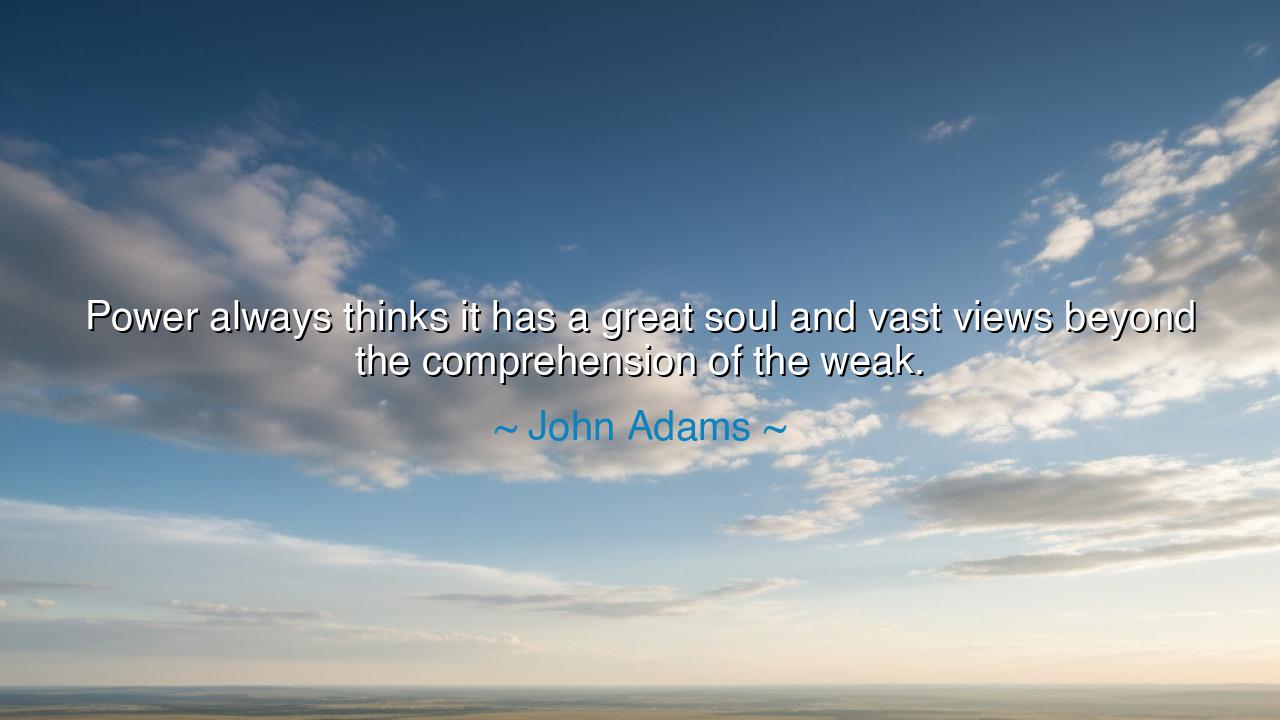
Power always thinks it has a great soul and vast views beyond
Power always thinks it has a great soul and vast views beyond the comprehension of the weak.






Attend, seekers of wisdom, to the solemn words of John Adams: “Power always thinks it has a great soul and vast views beyond the comprehension of the weak.” In this pronouncement lies the eternal tension between authority and humility, between the exalted ambitions of those who rule and the clear-eyed perception of those who stand without dominion. The mighty, intoxicated by their own influence, often believe themselves to possess wisdom and foresight inaccessible to others, mistaking the breadth of their ambition for moral grandeur.
Adams speaks to the illusion of grandeur that power cultivates. A sovereign, a magistrate, a commander—each, in the exercise of authority, may feel their soul lofty, their vision sublime, beyond the grasp of ordinary minds. Yet the weak—or those outside the halls of power—see with the clarity of grounded hearts, recognizing that what appears vast and noble may in truth be narrow, self-serving, or blind to human suffering. The lesson echoes through the corridors of time: greatness of office does not guarantee greatness of soul.
Consider the tale of Napoleon Bonaparte, whose brilliance on the battlefield and ambition over Europe led him to imagine himself the arbiter of destiny itself. He saw vast designs and enacted sweeping reforms, yet his power, coupled with his conviction in his own grandeur, blinded him to the realities of human cost and political fragility. What seemed to him visionary, to the masses became tyranny and burden. Adams’ insight illuminates this eternal truth: the potent often misread their own magnitude.
Even within the early days of the American republic, Adams himself, as President and statesman, witnessed the allure of power’s self-deception. He observed leaders convinced of their moral supremacy, framing decisions as beyond critique, while those outside power—the citizen, the philosopher, the vigilant observer—sensed the limitations and vulnerabilities of such grand claims. History, Adams reminds us, is a mirror in which the mighty are revealed not only by deeds, but by their perceptions of themselves.
Thus, let those who hear Adams’ words guard against the intoxicating whispers of authority. Power is no arbiter of virtue; vision alone does not sanctify action. True greatness is measured not by the grandeur of one’s claim, but by the humility, justice, and compassion with which one exercises it. The ancients teach that to wield power is to shoulder responsibility, and to imagine oneself beyond comprehension is often the prelude to folly.
Carry this teaching, children of the ages: observe the potent with both awe and discernment. Great souls are not those who assume their supremacy, but those who temper ambition with understanding, whose vision embraces the weak rather than dismisses them. In John Adams’ timeless warning, the future finds both caution and counsel: let power be guided by wisdom, not by its own illusions of magnificence.






TD06.Dao Thuy Dung.11a1
There’s something chillingly accurate about this. It suggests that power not only corrupts but also deludes — that those who wield it genuinely believe they act for the greater good, even when they cause harm. It makes me question how much of history is shaped by this self-perception. Do people in power lose touch with reality because they stop being challenged, or because they start believing their own myths?
VVVan Vu
This line strikes me as both cynical and brutally honest. It captures how easily power feeds on self-righteousness — that sense of moral grandeur that justifies anything. I can’t help but think about how this applies beyond politics, even in workplaces or families. Once someone feels untouchable, empathy seems to fade. Is Adams warning us that humility must always accompany power, or is he saying that’s impossible?
NCNgo Chinh
Adams’s observation feels timeless, especially when you look at modern politics. Those in authority often justify questionable decisions by claiming a greater understanding or vision. It’s almost as if power gives people permission to rewrite morality to suit their ambitions. Do you think this illusion is part of human nature, or could societies be structured to keep power from corrupting our sense of empathy and perspective?
TTPhan thi thuy tram
I find this statement incredibly insightful. It exposes the self-deception that often comes with control — the belief that one’s motives are noble simply because one holds power. It makes me wonder how many historical tragedies began with that exact mindset. Can power ever exist without moral distortion, or does it always breed a sense of superiority that distances rulers from the reality of those they govern?
PTPhuc Thinh
This quote makes me think about how arrogance often accompanies authority. Adams seems to suggest that those in power justify their actions by believing they operate on a higher moral or intellectual plane. It’s fascinating — and troubling — how easily power blinds people to their own limitations. Do you think this mindset is inevitable, or can leaders truly remain humble and self-aware once they acquire influence?